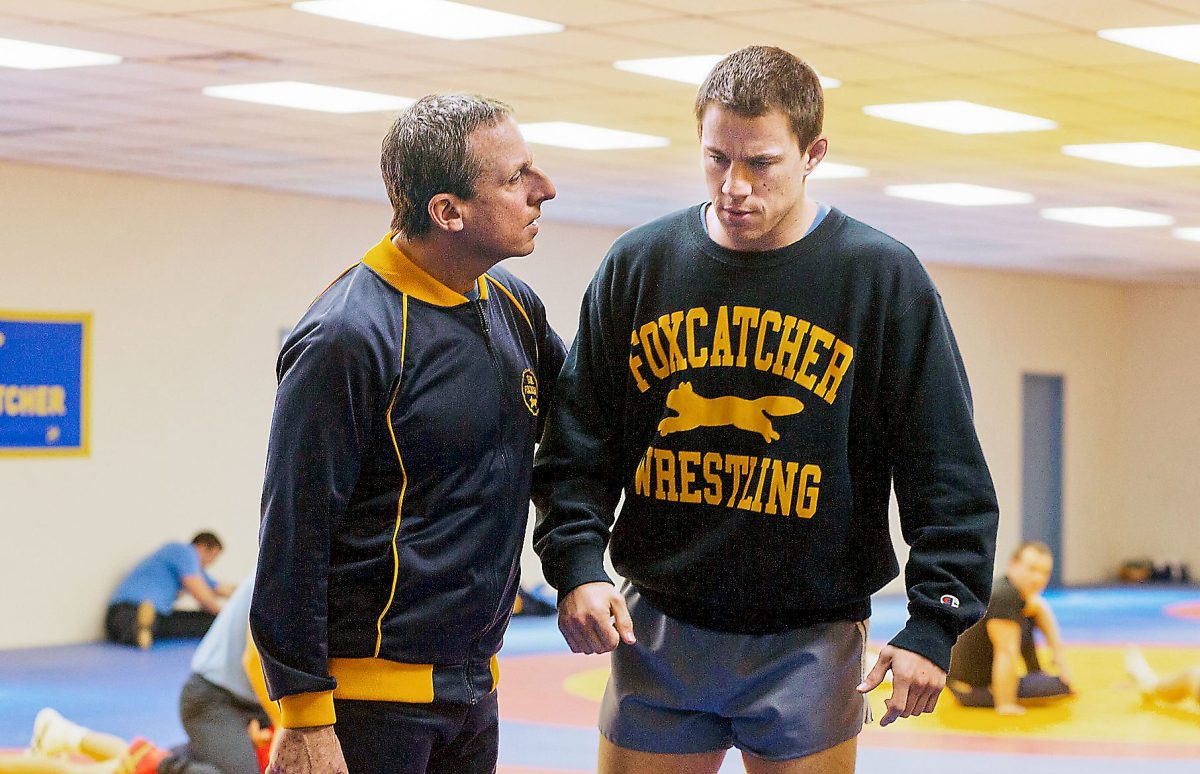
Perhaps it was a mistake to watch a 15-minute YouTube video featuring the real-life John du Pont before I settled in to watch the movie about him, Foxcatcher.
In the video, du Pont—heir to the DuPont chemical fortune—is giving a tour of his expansive Foxcatcher estate. He’s stiff, self-conscious, his grin overly fixed. He seems like a guy trying to project an air of noblesse oblige and failing. His hair is possibly dyed blond and his nose is somewhat beakish. Everything about him is just a little bit off.
You can imagine my surprise then when I saw Steve Carell’s wildly over-the-top depiction of du Pont in Foxcatcher. Let’s start with the prosthetic nose—it’s really impossible to ignore—which is about twice the size of the real du Pont’s. This elephantized schnoz is no small thing—literally or figuratively—it suggests that director Bennett Miller wanted to give us an exaggerated, grotesque version of the real man. That extends to the rest of Carell’s performance, which is aggressively weird—halting; nasal; at times, bizarrely without affect—everything about the real guy dialed up to 11. I’m just not sure why Miller and co. felt compelled to exaggerate. The story is strange, and tragic, enough as it is.
Du Pont, a social misfit with a withholding mother (played in just a few key scenes with impeccable disdain by Vanessa Redgrave) was painfully aware that people only indulged him because of his money. He tried to buy friends, then resented them when they weren’t appropriately worshipful.
He was particularly drawn to the glory and camaraderie of team sports, and that was how he came across wrestler Mark Schultz (Channing Tatum), an Olympic champ, perennially in the shadow of his more talented and gregarious brother David (Mark Ruffalo). While David had a wife (Sienna Miller) and two kids, Mark was a loner, the type who sits in a spartan apartment hunched over a cup of instant noodles. When du Pont flies Mark out to his estate, offers to let him train in his state-of-the-art facility, and pumps him with flattering speeches about American exceptionalism, how can Mark resist?
The relationship, of course, quickly becomes toxic—as du Pont needs Mark to be some sort of combination man-servant, boy-toy (it is hinted at that du Pont is a closeted homosexual), devoted son, and physical manifestation of du Pont’s own glory. Things are further complicated when David joins the Foxcatcher team—he’s too healthy to get ensnared in du Pont’s codependent web—and the three of them turn into this sort of highly dysfunctional love triangle.
Ruffalo and Tatum are great as the brothers, who communicate in blunt, physical ways. A scene where they express all their complex feelings for each other through an increasingly violent grapple is wonderful, as is another scene where they say goodbye, bowing their heads toward each other and nuzzling, like a pair of horses.
Tatum, in particular, dissolves into his part—he’s barely recognizable as the goofy heartthrob we all know and love. But even there I felt that he was encouraged to take his character a little too far. “More animalistic!” I could almost hear Miller screaming from behind the camera. “He’s a completely physical creature—barely a man at all!”
While Miller creates an effective air of encroaching doom, the film’s relentless moroseness grows tiresome. (It’s like, We get it! They were wretched creatures doomed from the start!) However, a scene on du Pont’s helicopter where du Pont coaches Mark on the exact gushing language to use to introduce him at an awards banquet is the film at its best—bizarrely funny, slyly revealing, allowing both actors to shine.
I loved both of Miller’s previous features (Capote and Moneyball) and fully expected to love this one, too. But, as smart and sometimes stirring as Foxcatcher can be, its lack of restraint killed it for me—by a nose.
